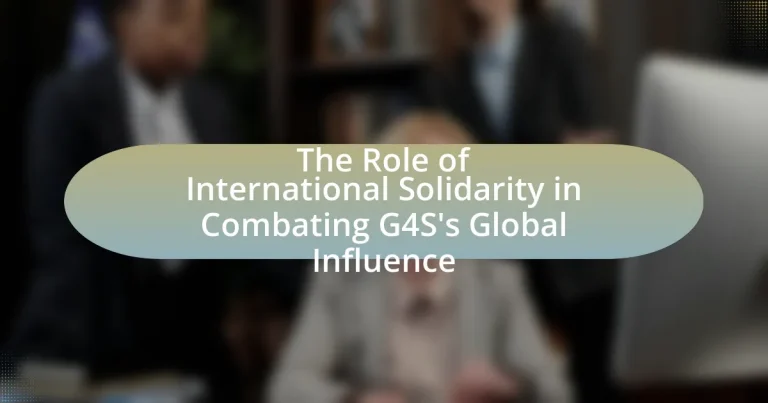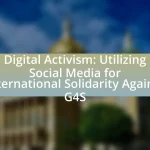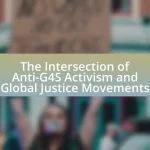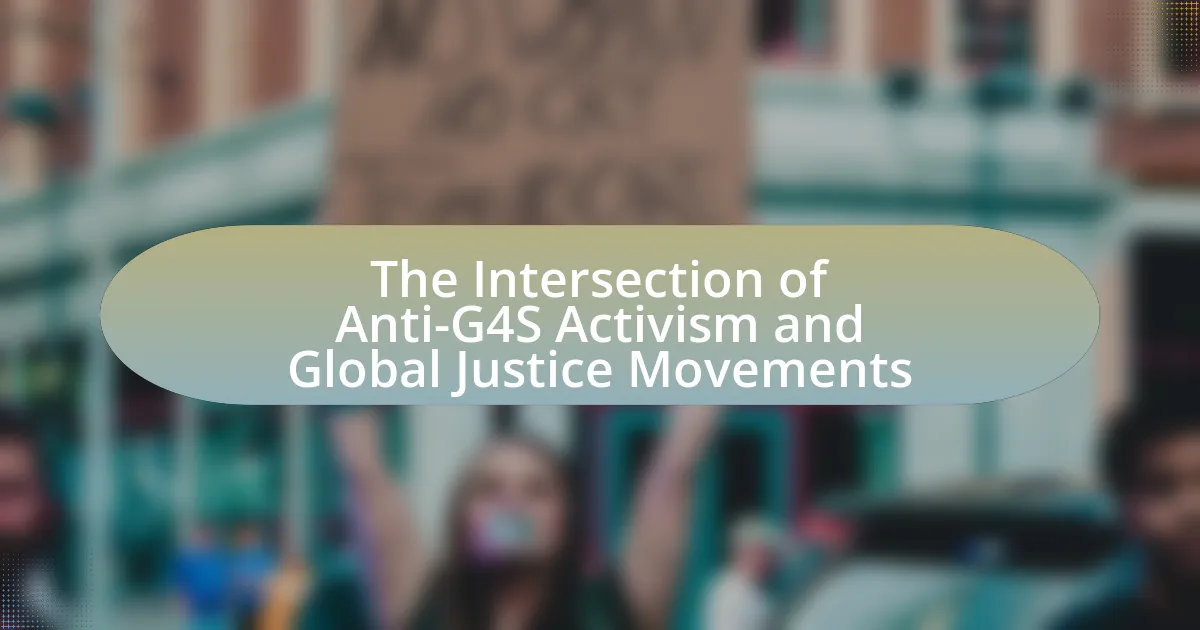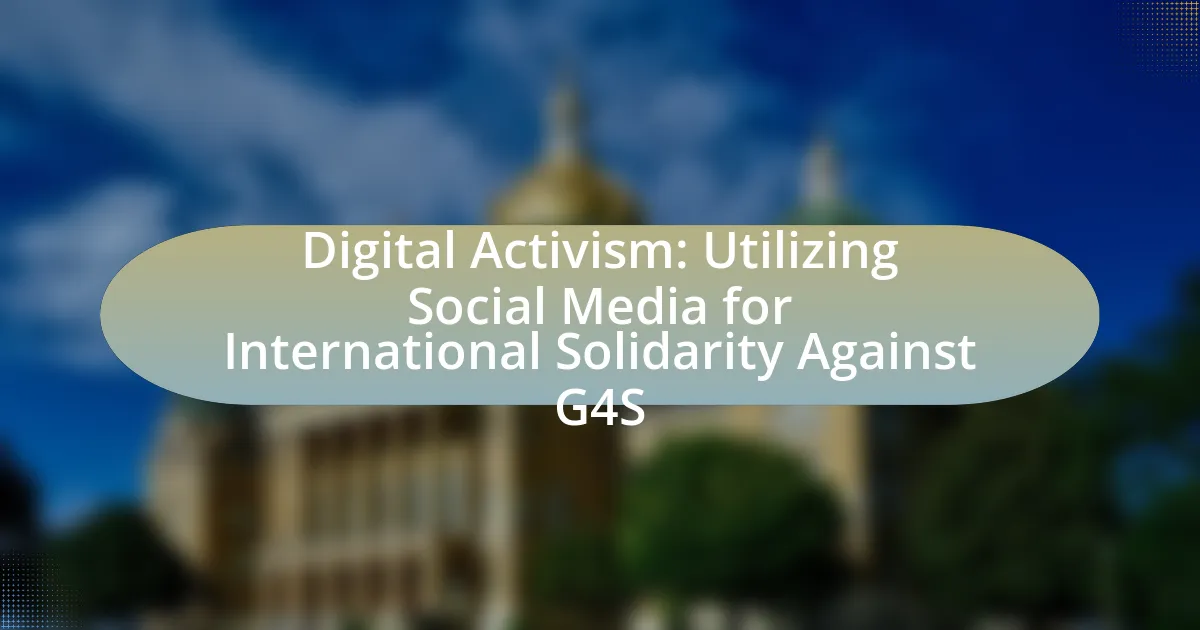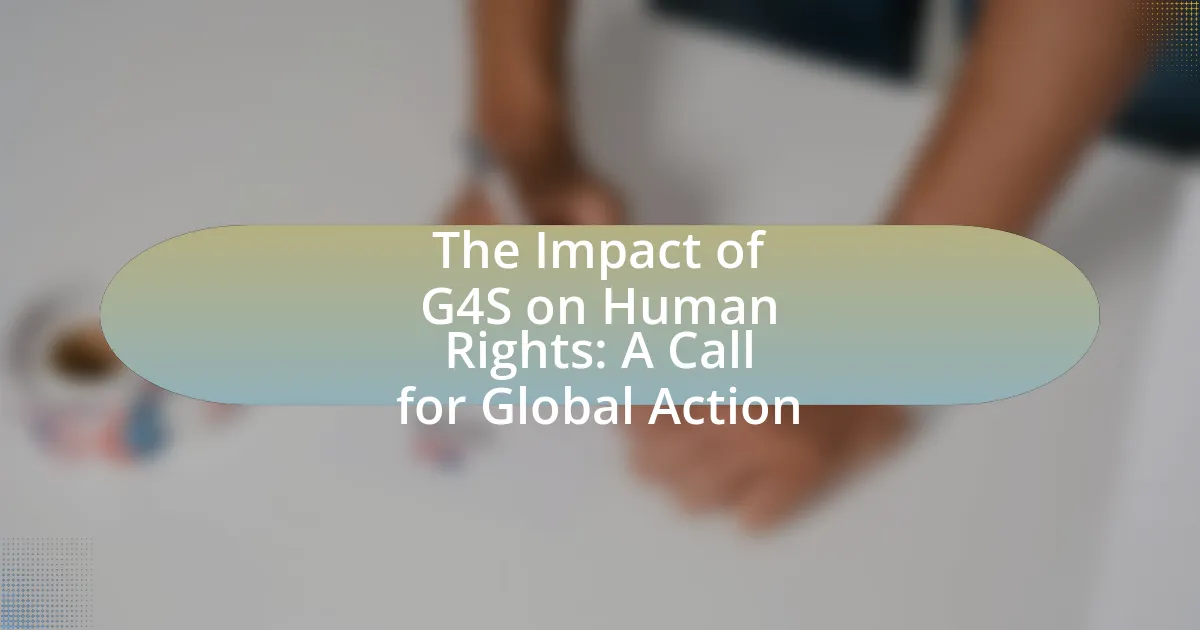The article examines the role of international solidarity in addressing the global influence of G4S, a multinational security firm known for its controversial practices, including human rights violations and the privatization of public services. It highlights how collective action from diverse groups, such as labor unions and civil society organizations, has effectively challenged G4S’s operations through campaigns, boycotts, and divestments. Key principles of international solidarity, including mutual support and collective action, are discussed in relation to G4S’s impact on local communities and global security. The article also addresses the challenges faced by solidarity movements, including political and economic barriers, and outlines strategies for strengthening collaboration and engagement against G4S’s influence.
What is the Role of International Solidarity in Combating G4S’s Global Influence?
International solidarity plays a crucial role in combating G4S’s global influence by uniting diverse groups against its practices, particularly in human rights violations and privatization of public services. This collective action amplifies the voices of marginalized communities affected by G4S’s operations, fostering awareness and mobilizing resources for advocacy. For instance, campaigns led by organizations such as the International Trade Union Confederation have highlighted G4S’s involvement in controversial activities, leading to increased scrutiny and pressure on the company. Furthermore, solidarity actions, including boycotts and divestments, have been effective in challenging G4S’s contracts and operations in various countries, demonstrating the power of coordinated international efforts to hold corporations accountable.
How does international solidarity manifest in the context of G4S?
International solidarity in the context of G4S manifests through coordinated global campaigns and actions aimed at challenging the company’s practices, particularly regarding human rights violations and labor conditions. Activist groups, labor unions, and civil society organizations from various countries collaborate to raise awareness, share resources, and mobilize public opinion against G4S’s operations, especially in conflict zones and areas with reported abuses. For instance, the Boycott G4S campaign, which gained traction in multiple countries, exemplifies this solidarity by uniting diverse stakeholders to pressure institutions to divest from G4S, highlighting the collective effort to hold the company accountable for its actions.
What are the key principles of international solidarity?
The key principles of international solidarity include mutual support, shared responsibility, and collective action. Mutual support emphasizes the importance of countries and communities assisting one another in times of need, particularly during crises such as natural disasters or humanitarian emergencies. Shared responsibility highlights the obligation of nations to address global challenges collaboratively, recognizing that issues like poverty, inequality, and climate change transcend borders. Collective action involves coordinated efforts among states, organizations, and individuals to achieve common goals, such as promoting human rights and social justice. These principles are essential for fostering cooperation and enhancing the effectiveness of responses to global issues, as evidenced by international agreements like the Paris Agreement on climate change, which relies on the commitment of multiple nations to work together for a sustainable future.
How do these principles apply to G4S’s operations?
The principles of international solidarity apply to G4S’s operations by fostering collaboration among various stakeholders to challenge the company’s global influence. G4S, as a multinational security firm, faces scrutiny for its involvement in controversial practices, such as operating in conflict zones and providing security services in politically sensitive areas. Activist groups and labor unions leverage international solidarity to mobilize public opinion and pressure governments and organizations to reconsider their contracts with G4S. For instance, campaigns have highlighted G4S’s role in the Israeli-Palestinian conflict, leading to divestment actions by institutions like the University of California system. This collective action exemplifies how principles of solidarity can effectively counter G4S’s operations and promote accountability.
Why is combating G4S’s global influence important?
Combating G4S’s global influence is important because the company plays a significant role in the privatization of security and incarceration, which can lead to human rights abuses. G4S operates in various countries, providing security services that often lack accountability, contributing to systemic issues such as mass incarceration and the militarization of policing. For instance, G4S has been criticized for its involvement in the Israeli occupation of Palestine, where its security operations have been linked to violations of international law. Addressing G4S’s influence is crucial for promoting ethical standards in security practices and protecting vulnerable populations from exploitation and abuse.
What are the implications of G4S’s influence on global security?
G4S’s influence on global security has significant implications, primarily shaping the privatization of security services and impacting public safety policies. The company’s extensive operations in over 90 countries, including its role in managing prisons and providing security for major events, demonstrate its capacity to affect national security frameworks. For instance, G4S’s involvement in controversial practices, such as the management of immigration detention centers, raises ethical concerns and questions about accountability in security provision. This privatization trend can lead to reduced governmental oversight and increased reliance on profit-driven motives, potentially compromising the integrity of security measures. Furthermore, G4S’s influence can exacerbate inequalities in security access, as wealthier nations may benefit from enhanced security services while poorer regions remain underserved.
How does G4S’s presence affect local communities?
G4S’s presence affects local communities by increasing security measures and often leading to heightened surveillance. This can result in a sense of safety for some residents, but it may also foster an environment of mistrust and fear among others, particularly in areas where G4S operates in contexts of conflict or social unrest. For instance, in regions where G4S provides security services, reports indicate that communities experience a dual impact: enhanced protection against crime but also potential human rights concerns due to aggressive policing tactics. Studies have shown that the presence of private security firms like G4S can lead to increased tensions between local populations and security personnel, as seen in various case studies across different countries.
What strategies are employed in international solidarity efforts against G4S?
International solidarity efforts against G4S employ strategies such as coordinated global campaigns, grassroots mobilization, and strategic partnerships with human rights organizations. These campaigns often focus on raising awareness about G4S’s involvement in controversial practices, such as privatized detention and security services in conflict zones. For instance, organizations like the Boycott, Divestment, Sanctions (BDS) movement have successfully mobilized international support to pressure institutions to divest from G4S, highlighting its role in the Israeli occupation. Additionally, solidarity networks facilitate information sharing and collective action, amplifying local struggles against G4S’s operations worldwide.
What role do grassroots movements play in these strategies?
Grassroots movements play a crucial role in strategies aimed at combating G4S’s global influence by mobilizing local communities and raising awareness about human rights violations. These movements often serve as the foundation for larger international solidarity efforts, leveraging local knowledge and networks to advocate for change. For instance, grassroots organizations have successfully organized protests and campaigns that highlight G4S’s involvement in controversial practices, such as privatized detention and security services linked to human rights abuses. This localized activism not only amplifies the voices of affected communities but also pressures policymakers and corporations to reconsider their associations with G4S, thereby contributing to a broader movement for accountability and justice.
How do international organizations contribute to these efforts?
International organizations contribute to efforts against G4S’s global influence by facilitating collaboration among member states, providing resources, and advocating for human rights standards. For instance, organizations like the United Nations and Amnesty International mobilize international support, raise awareness about G4S’s practices, and promote accountability through reports and resolutions. These entities often coordinate campaigns that highlight violations and encourage countries to adopt policies that limit G4S’s operations, thereby reinforcing global solidarity in addressing corporate misconduct.
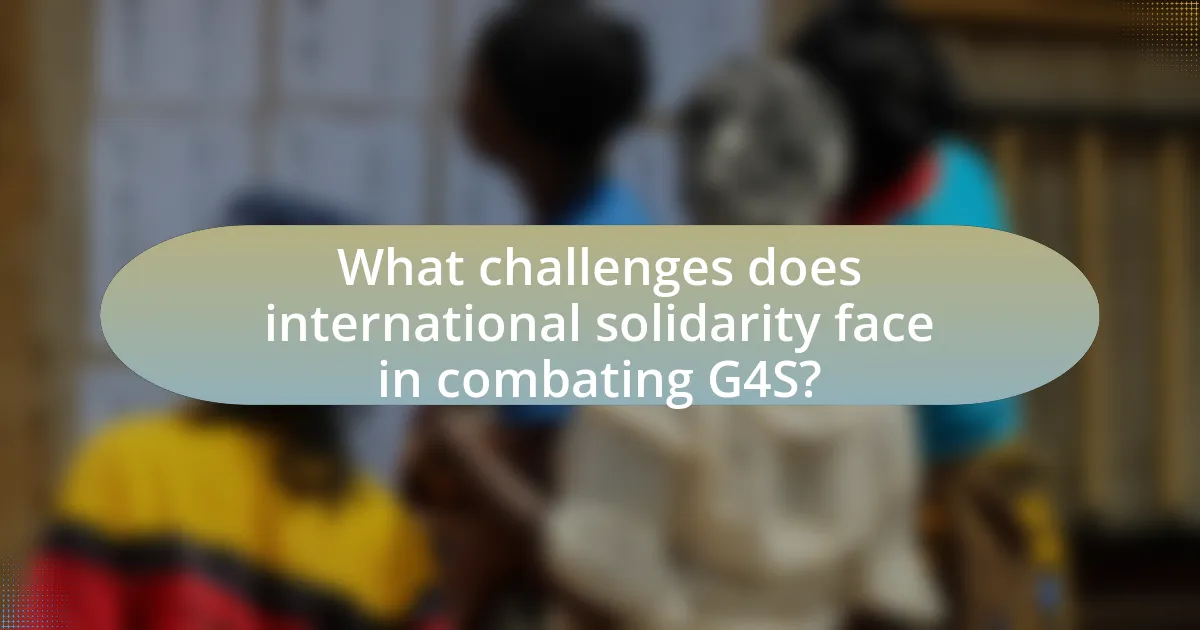
What challenges does international solidarity face in combating G4S?
International solidarity faces significant challenges in combating G4S, primarily due to the company’s extensive global reach and influence. G4S operates in over 90 countries, making coordinated international action difficult as local contexts and legal frameworks vary widely. Additionally, the company’s financial resources enable it to engage in aggressive lobbying and public relations campaigns, which can undermine solidarity efforts. Furthermore, differing priorities and strategies among various activist groups can lead to fragmentation, reducing the overall effectiveness of collective action against G4S. These factors collectively hinder the ability of international solidarity movements to present a unified front against the company’s practices.
How do political and economic factors hinder solidarity efforts?
Political and economic factors hinder solidarity efforts by creating divisions among groups that seek to collaborate against entities like G4S. Political instability, such as government repression or lack of support for social movements, can discourage collective action by instilling fear or uncertainty among potential allies. Economic disparities, including unequal resource distribution and varying levels of economic development, can lead to competition rather than cooperation, as groups prioritize their immediate financial needs over broader solidarity goals. For instance, in regions where G4S operates, local economic pressures may compel organizations to focus on survival rather than engaging in international solidarity, thereby weakening unified resistance against corporate influence.
What specific political barriers exist in different regions?
Specific political barriers in different regions include authoritarian regimes, which suppress dissent and limit civil liberties, as seen in countries like North Korea and Belarus. In the Middle East, ongoing conflicts and instability hinder political participation and governance, exemplified by Syria and Yemen. In Latin America, corruption and weak institutions obstruct democratic processes, evident in Venezuela and Nicaragua. Additionally, in regions like Africa, colonial legacies and ethnic divisions create challenges for political cohesion, as observed in countries such as South Sudan and the Democratic Republic of the Congo. These barriers significantly impact the ability of civil society and international solidarity movements to effectively challenge entities like G4S.
How do economic interests complicate the fight against G4S?
Economic interests complicate the fight against G4S by creating financial dependencies that hinder collective action against the company. Many governments and organizations rely on G4S for security services, which can lead to reluctance in criticizing or opposing its practices due to potential economic repercussions. For instance, G4S operates in various sectors, including prisons and immigration detention, where its contracts can be lucrative for local economies. This financial entanglement often results in a prioritization of economic benefits over ethical considerations, making it challenging for activists and international solidarity movements to mobilize effectively against G4S’s global influence.
What are the risks associated with international solidarity movements?
International solidarity movements face several risks, including backlash from governments, misrepresentation of goals, and potential co-optation by political agendas. Governments may respond to these movements with repression, as seen in cases like the 2019 protests in Hong Kong, where activists faced severe penalties for their solidarity actions. Misrepresentation can occur when the objectives of the movement are distorted by media or opposing factions, leading to public misunderstanding, as evidenced by the varied interpretations of the Boycott, Divestment, Sanctions (BDS) movement against Israel. Additionally, co-optation can undermine the original intent of solidarity movements, as political entities may adopt their rhetoric for their own purposes, diluting the movement’s impact and authenticity.
How can activists protect themselves while advocating against G4S?
Activists can protect themselves while advocating against G4S by employing digital security measures, organizing collective actions, and maintaining legal awareness. Digital security measures include using encrypted communication tools and secure passwords to safeguard sensitive information. Collective actions, such as protests or campaigns, create a united front that can deter potential retaliation from G4S. Additionally, understanding legal rights and protections can help activists navigate potential legal challenges, as laws vary by region and can provide avenues for defense against harassment or legal action. These strategies are supported by various activist organizations that emphasize the importance of safety and security in advocacy work.
What legal challenges do solidarity movements encounter?
Solidarity movements encounter legal challenges such as restrictions on assembly, anti-protest laws, and limitations on funding. These challenges often arise from governmental efforts to control dissent and maintain order, which can lead to the criminalization of peaceful protests. For instance, in various countries, laws have been enacted that impose heavy fines or imprisonment for participating in unauthorized demonstrations, thereby stifling the ability of solidarity movements to mobilize effectively. Additionally, legal actions can be taken against organizations that provide financial support to these movements, as seen in cases where foreign funding is scrutinized under national security laws.
How can international solidarity be strengthened to combat G4S’s influence?
International solidarity can be strengthened to combat G4S’s influence through coordinated global campaigns that raise awareness and mobilize public opinion against the company’s practices. By uniting labor unions, human rights organizations, and community groups across different countries, these campaigns can leverage collective bargaining power and amplify voices calling for accountability. For instance, the International Trade Union Confederation has previously highlighted G4S’s involvement in human rights abuses, demonstrating the effectiveness of international collaboration in addressing corporate misconduct. Additionally, sharing resources and strategies among organizations can enhance the impact of local efforts, creating a more formidable opposition to G4S’s operations worldwide.
What best practices can enhance collaboration among activists?
Effective communication is a best practice that can enhance collaboration among activists. Clear and open dialogue fosters understanding and alignment on goals, strategies, and actions. Research shows that organizations with strong communication practices are 25% more likely to achieve their objectives. Additionally, establishing shared goals and values among activists creates a unified direction, which is crucial for coordinated efforts. Regular meetings and collaborative platforms, such as shared online workspaces, facilitate ongoing engagement and information sharing, further strengthening the collaborative process.
How can technology be leveraged to support solidarity efforts?
Technology can be leveraged to support solidarity efforts by facilitating communication, mobilizing resources, and amplifying voices. Digital platforms enable activists and organizations to connect globally, share information, and coordinate actions in real-time, which enhances collective action against entities like G4S. For instance, social media campaigns can raise awareness and foster community engagement, as seen in movements like #BlackLivesMatter, which utilized Twitter to organize protests and share experiences. Additionally, crowdfunding platforms allow for financial support to be directed towards solidarity initiatives, enabling grassroots movements to sustain their efforts. Data analytics can also identify trends and measure the impact of solidarity actions, providing evidence for advocacy and policy change.
What role does education play in building awareness and solidarity?
Education plays a crucial role in building awareness and solidarity by equipping individuals with knowledge about social issues and fostering critical thinking. Through educational programs, people learn about the impact of corporate practices, such as those of G4S, on human rights and social justice. For instance, studies have shown that educational initiatives can increase public understanding of systemic inequalities, leading to greater collective action. Research by the Global Partnership for Education indicates that informed communities are more likely to engage in advocacy and support movements that promote equity and justice, thereby enhancing solidarity among diverse groups.
What practical steps can individuals take to support international solidarity against G4S?
Individuals can support international solidarity against G4S by participating in campaigns that raise awareness about the company’s human rights violations and unethical practices. Engaging in social media activism, such as sharing informative content and using relevant hashtags, amplifies the message and reaches a broader audience. Additionally, individuals can support organizations that advocate for the rights of those affected by G4S, such as Amnesty International, which documents and reports on the company’s actions. Attending protests or community events focused on G4S’s impact can also demonstrate solidarity and pressure decision-makers. Furthermore, individuals can choose to boycott G4S services and encourage others to do the same, thereby impacting the company’s financial standing. These actions collectively contribute to a stronger international movement against G4S’s global influence.
How can individuals engage with local and global movements?
Individuals can engage with local and global movements by participating in advocacy, volunteering, and raising awareness through social media. Advocacy involves joining or supporting organizations that align with specific causes, such as human rights or environmental protection, which can amplify collective efforts. Volunteering for local initiatives or global campaigns allows individuals to contribute their time and skills directly to the movement’s goals. Additionally, using social media platforms to share information, mobilize support, and connect with like-minded individuals can significantly enhance the reach and impact of these movements. For instance, the global climate strikes organized by youth activists have demonstrated how social media can mobilize millions worldwide, showcasing the power of individual engagement in larger movements.
What resources are available for those looking to get involved?
Individuals looking to get involved in combating G4S’s global influence can access various resources, including advocacy organizations, online platforms, and community groups focused on human rights and corporate accountability. Notable organizations such as Amnesty International and Human Rights Watch provide toolkits, reports, and action alerts that guide individuals on how to participate in campaigns against G4S’s practices. Additionally, social media platforms and websites like Change.org offer petitions and mobilization efforts that allow individuals to engage directly with ongoing initiatives. These resources are validated by the active campaigns and documented impacts of these organizations in raising awareness and influencing policy changes regarding corporate practices.
